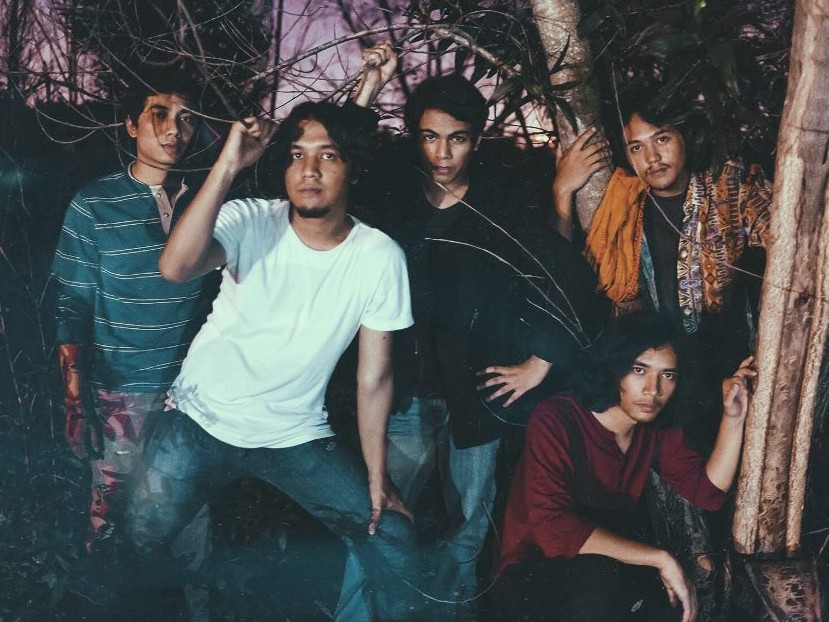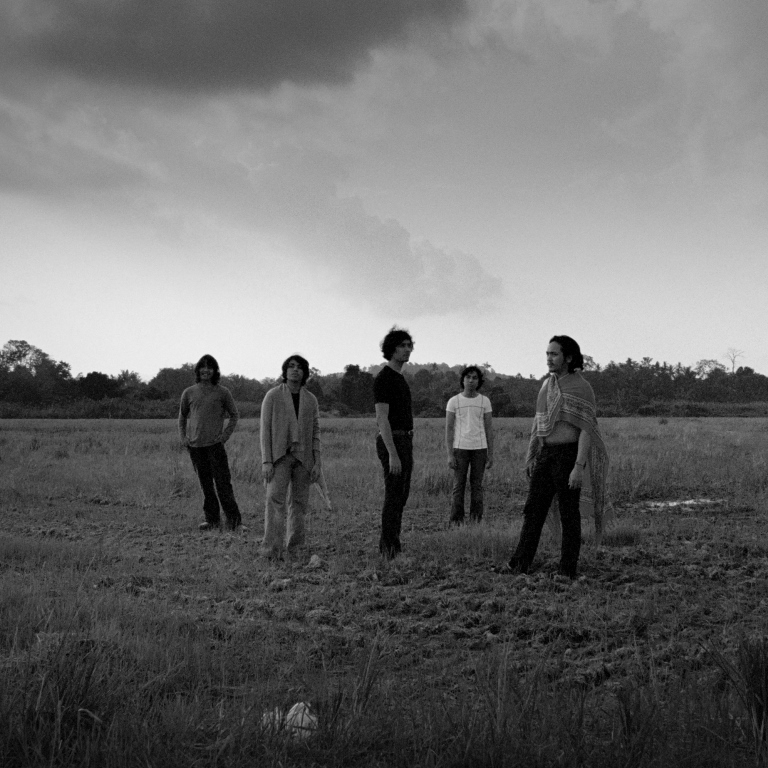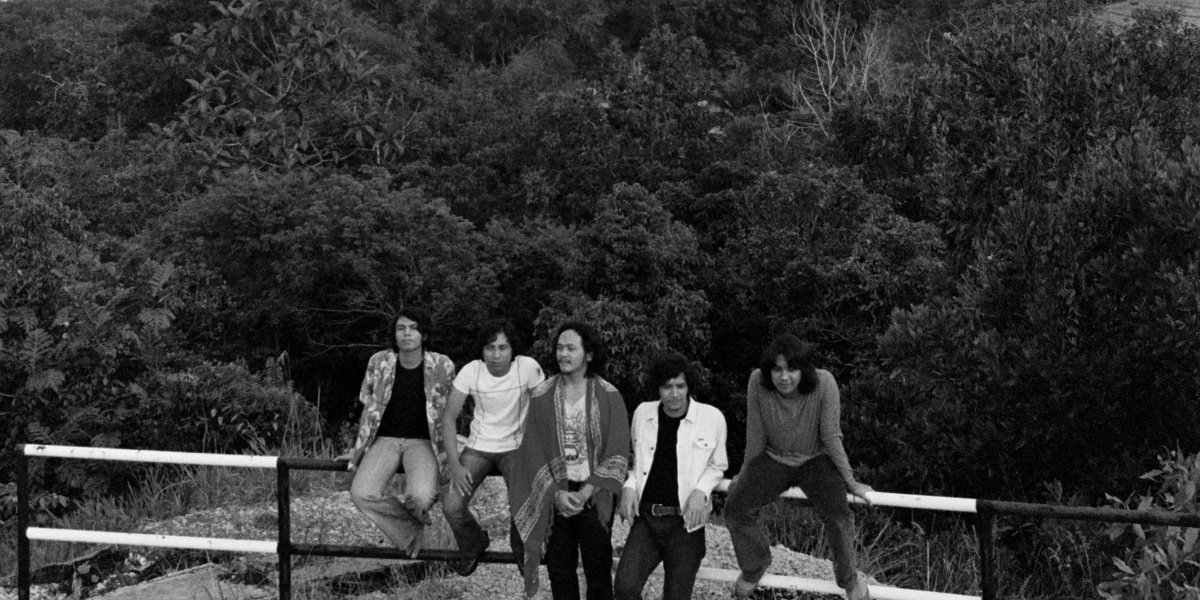Ramayan, Standing on Their Own Feet Together
 Thirsty for JUICE content? Quench your cravings on our Instagram, TikTok and WhatsApp
Thirsty for JUICE content? Quench your cravings on our Instagram, TikTok and WhatsApp
Capturing the energy and sensibility of the music of the ‘70s is the aim for the much touted nusantara psych rock band from Sungai Buloh – Ramayan. It is in the feeling, they say, and to achieve something as intangible as that, it’s all part of the creative process. Their debut self-titled EP was recorded live where all the instruments were recorded simultaneously as one of the ways to distil the lively essence into their first effort. With the help of producer Yasin – drummer of Pitahati – and sound engineer Husyairi Hamzah, or affectionately, Bear, they’ve created a vibrant, transportative, accessible rock’n’roll EP with psychedelic characteristics.
Images Alif Syazwan
“I think for us, psychedelic in our context is in the mindset, not the genre.”
The young men who make up the two-year-old Ramayan have a musical appetite that ranges from their referential era’s icons such as Todd Rundgren, Bee Gees, and Janis Joplin, but in terms of production, they try to make it contemporary. Although it’d be fair to describe their music as psychedelic, Ramayan isn’t strictly bordering themselves within that genre. Drummer Que explains, “I think for us, psychedelic in our context is in the mindset, not the genre. The elements of psychedelic rock involves experimenting around and to roam around freely — we still diversify our elements.” In an interview with BFM, they joked that their preference for retro music (they idolise The Beatles, for instance) has caused them to fall into a state of depression and isolation among their peers. We repeat this, and they echo the same sentiment, still. Bassist Omar goes, “We enjoy the tranquillity of being in solitude, being in solitude together.” But is being alone with four other people the same? Que quips, “You’re alone, I’m alone, why don’t we share this feeling together?” One of the products of that period is lead single ‘Oh Dewiku’ – the pop ballad as influenced by The Beatles, which recently received a beautiful music video that was shot in Perlis.
“Our music is personal, but it’s accessible – that’s the most important thing. You have to let people in.”
Nevertheless, jesting aside, they express a fundamental quality in their music — inclusion. “Our music is personal, but it’s accessible – that’s the most important thing. You have to let people in.” The psych aspects found in Ramayan’s songs aren’t indulgently space-y or far out that a sense of distance is created between band and listener. At the mention that we saw them open for Seven Collar T-Shirt, we comment that though the band, especially vocalist and rhythm guitarist Syafi’e, looked in a complete state of trance, we could still approach their performance without feeling like encroaching on insular, scared boundaries. He replies, “You can get into the groove right? That’s the shared feeling – everyone can feel what we feel.”
Without any prompting, Syafi’e elucidates his onstage headspace, “It’s dangerous to be in a state of trance without realising things around you – I don’t take drugs. I don’t completely lose myself on stage.” He points to his head, “It’s different from what you know in here and what you feel in here,” gesturing to his chest as he finishes his thought. Omar, on one hand, goes, “I do take drugs when I’m on stage,” pausing for effect, “Sometimes I have the flu, fever, so I have to take my meds (laughs).”

“Since people know that I’m related to [members of Pitahati], they’d automatically make the connection.” – Syafi’e
Lyrically, it was a choice and challenge for Syafi’e – whose first language is English – to write in Malay, unlike his bandmates who inherently express themselves in Malay. “At that time, I was an English speaker trying to know a very Malay circle. I speak to my bandmates in Malay, I read Malay books, and watch Malay movies, I just don’t have the practice of putting it all in Malay,” he says. He’s a fan of David Bowie’s lyrics that are plainspoken but yielding much subtext and subliminal stories, “It’s not saying things that are straightforward with no meaning behind it. I get that element, but I make it Malay.”
And the inevitable question comes, “Does it get annoying that people hound you all with questions about Pitahati?” If it’s not already known, Syafi’e is related to three members of the beloved and established band. “Since people know that I’m related to them, they’d automatically make the connection, ‘Oh, no wonder you sound like that! No wonder!’” But of course, he’s being sarcastic. Anyone who actually listens to the respective bands’ songs would know that they are distinct from one another. Unsurprisingly, the band uses the Lennons to make a point of the inescapable familial comparison despite individuality. Referring to Sean Lennon, and by extension themselves, “He’s standing on his own two feet, you know?”
Ramayan’s self-titled EP is available digitally and at record stores. For the full list of record stores, click here.
www.facebook.com/ramayanmusik
www.instagram.com/ramayanmusik
soundcloud.com/ramayanmusik

 Get Audio+
Get Audio+ Hot FM
Hot FM Kool 101
Kool 101 Eight FM
Eight FM Fly FM
Fly FM Molek FM
Molek FM